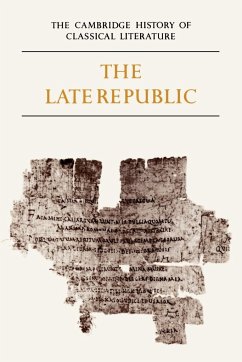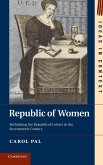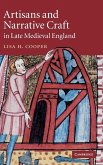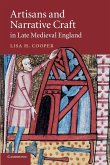This volume covers a relatively short span of time, rather less than the first three-quarters of the first century BC; but it was an age of profoundly important developments, with enduring consequences for the subsequent history of Latin literature. Original and innovative in widely differing ways as was the work of Lucretius, Sallust and Caesar in particular, the scene is dominated, historically, by two figures: Cicero and Catullus. Cicero was a politician and a man of affairs as well as a man of latters, whose vast literary output reflects a range of intellectual interests unparalleled among surviving Roman writers; creator of a prose style the Quintilian regarded as synonymous with eloquence itself; and better known to us, from his letters, as a human being, than any other figure from classical antiquity. Catullus was a poet, single-mindedly devoted to fostering the tradition of learned Alexandrian poetry at Rome; the author of one slender volume of verse that has attracted more critical attention in proportion to its size than any other ancient poetry-book; and the lover of Lesbia. In these chapters it is shown how these, and other, Roman writers of genius continued the process of transforming their traditional Greek models into new and vigorous Latin forms, with lasting effects for oratory, historiography, and the higher genres of poetry.
Table of contents:
1. Predecessors E. J. Kennedy; 2. The new direction in poetry W. V. Clasen; 3. Lucretius Alexander Dalzell; 4. Cicero and the relationship of oratory to literature L. P. Wilkinson; 5. Sallust F. R. D. Goodyear; 6. Caesar R. M. Ogilvie; 7. Prose and mine Nicholas Horsfall; Appendix Martin Drury; Metrical appendix Martin Drury; Abbreviations; Index.
This volume covers the first three-quarters of the first century BC; an age which had enduring consequences for the subsequent history of Latin literature. The scene was dominated by two figures: Cicero and Catallus. This book shows how these and other Roman writers helped transform their traditional Greek models into new, vigorous Latin forms.
Hinweis: Dieser Artikel kann nur an eine deutsche Lieferadresse ausgeliefert werden.
Table of contents:
1. Predecessors E. J. Kennedy; 2. The new direction in poetry W. V. Clasen; 3. Lucretius Alexander Dalzell; 4. Cicero and the relationship of oratory to literature L. P. Wilkinson; 5. Sallust F. R. D. Goodyear; 6. Caesar R. M. Ogilvie; 7. Prose and mine Nicholas Horsfall; Appendix Martin Drury; Metrical appendix Martin Drury; Abbreviations; Index.
This volume covers the first three-quarters of the first century BC; an age which had enduring consequences for the subsequent history of Latin literature. The scene was dominated by two figures: Cicero and Catallus. This book shows how these and other Roman writers helped transform their traditional Greek models into new, vigorous Latin forms.
Hinweis: Dieser Artikel kann nur an eine deutsche Lieferadresse ausgeliefert werden.








